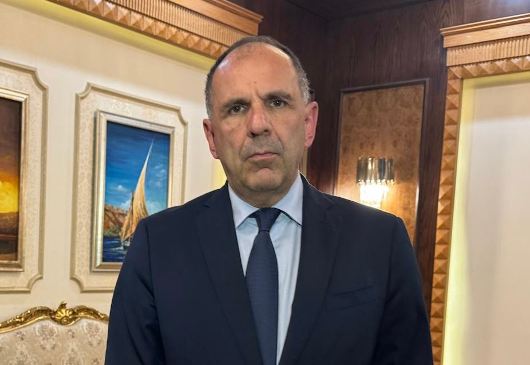 Today, we completed our tour in the Middle East to the countries that play an important role in de-escalating the crisis in the region. In Saudi Arabia, Egypt, and Jordan, we had contacts at the highest level. We met with President Sisi of Egypt, King Abdullah of Jordan, the Secretary General of the Arab League, as well as with the Foreign Ministers of these countries.
Today, we completed our tour in the Middle East to the countries that play an important role in de-escalating the crisis in the region. In Saudi Arabia, Egypt, and Jordan, we had contacts at the highest level. We met with President Sisi of Egypt, King Abdullah of Jordan, the Secretary General of the Arab League, as well as with the Foreign Ministers of these countries.
What emerges from this tour is that Greece will have a say in the day after as a reliable interlocutor of all parties with strong diplomatic capital. Thus, Greece remains committed to halting the current crisis as soon as possible. A humanitarian crisis that plagues the region. We are working to prevent a spillover of hostilities to other regions and, in particular, to the Red Sea, where we are currently experiencing serious security incidents related to navigation and, of course, to prepare for the day after.
JOURNALIST: Minister, we are aware that our relationship with Egypt, particularly in recent years, is strategic. Given the situation in the Middle East, with tensions threatening to spill over, do you believe that this relationship can be even further developed and that it can produce even more results in the wider region, especially in the Eastern Mediterranean?
G. GERAPETRITIS: Egypt is a strategic partner of Greece, especially today because of its geostrategic position. It is all the more necessary to develop our relations, so that we can deepen and expand our strategic cooperation. Greece is Egypt's strongest ally in the European Union and, particularly, regarding the development of the strategic relationship between the European Union and Egypt. Greece and Egypt will continue to deepen their alliance based on their cultural, commercial, and energy cooperation, predicated on the electricity-power interconnection. The two countries have deep roots that will further grow. The alliance that Greece is developing in the wider region is crucial both for the Eastern Mediterranean and for the prosperity of our wider region.
January 17, 2024


